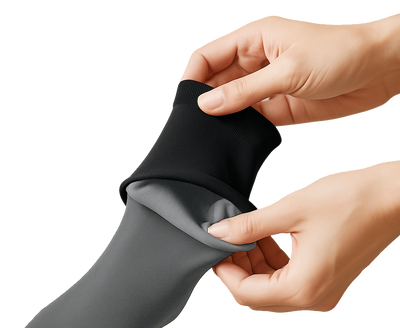Restless Legs Awareness Day

Restless leg syndrome awareness day falls on the 23rd of September 2020.
We dedicate this day to an often unrecognized and misdiagnosed problem – restless leg syndrome. So, restless legs awareness day was created for us to talk about the symptoms, the causes, the treatments, and to learn how to recognize it in us, and our close ones.
What is restless leg syndrome and how is it treated?
The restless leg syndrome, also known as the Willis-Ekbom disease is a problem in the nervous system characterized by the uncontrollable urge to move legs.
This syndrome, the RLS, creates an unpleasant feeling in the legs resulting in an irresistible urge to move. These unpleasant feelings are often described as ache or pain, an internal itch or tingling, or as if there were tiny bugs crawling in the leg area.
The syndrome itself is not often taken seriously, nor dedicated attention to it. Especially if the RLS is not severe. For example, restless leg syndrome in children is often misdiagnosed with discomfort caused by a growing body and bones.
When it comes to treatment, there are many different ways of toning down the symptoms, and we will talk about them further in the article.
How do I know if I have restless leg syndrome?
As it is with any other problem or disease, the best way is to sit down with your doctor and have an honest talk.

There is no such thing as a quiz or a test that you can take to find out about the syndrome. The diagnosis is based on your symptoms and your doctor’s knowledge. However, before you go to a doctor, here are some aspects, or questions about the RLS, that you could consider.
- How often do you experience the discomfort?
- How sever is that discomfort?
- How sever is your urge to move the legs, and how often do you experience it?
- How much pleasure, or relief you experience when you move your legs?
- Does this affect your sleep?
- Does this affect your relaxing and being still during the day?
- Do you feel tired during the day?
- Does it affect your mood?
If answers to the majority of these questions are positive, they may point toward the RLS, and you should take it to your doctor’s office.
Nevertheless, if you find any problem that may affect your life quality, you should run it to your doctor, and not rely as much on the info you get from the internet. Maybe you don’t have the RLS, but you suffer from high levels of stress, or insomnia, etc. The best way to know is to see a doctor.
The root cause of restless leg syndrome

There is not one certified cause of RLS. The risk factors may include iron deficiency, vitamin b12 deficiency, kidney failure, venous insufficiency, arthritis, Parkinson’s’ disease, diabetes, the use of certain medication, having surgery, etc.
Restless leg syndrome and iron deficiency
Iron deficiency is the most constant factor related to restless leg syndrome. Curing the symptoms of iron insufficiency, or compensating levels of iron may minimize or cure restless legs.
Restless legs and menopause
Menopause can cause a lot of changes in the body and create a lot of struggles until the women’s body doesn’t stabilize in this new condition. Many women experience insomnia during menopause, and it is shown that 70 % of women experience RLS in menopause.
Restless legs and pregnancy
Around approximately 30% of pregnant women experience some level of restless legs. It is not serious, nor unusual, but it can be annoying. It can disturb sleep and cause insomnia.
So, if you are asking yourself what helps with restless legs at night while pregnant, you can try compression socks or weighted blankets.
Restless leg syndrome and migraines
Newer studies show that restless leg syndrome can also be related to migraines. People who suffer from migraines experience many other health problems, and one of them can be RLS.

Restless legs venous insufficiency
Restless legs are one of the symptoms of venous insufficiency that is often forgotten about, or not talked about. However, some studies have shown that having restless legs is an often-side effect of varicose veins. In that case, treating venous insufficiency can improve problems with restless legs, if not solve them in all.
Restless legs after surgery
During surgery, people often lose a lot of blood, which can lead to a drop in iron levels, and iron insufficiency. As we know now, iron deficiency is likely to cause restless legs. Where the problem worsens, is that after surgery, people need to rest, and maybe cannot move their legs. This leads to not gaining relief from restless legs.
Do compression socks help with restless leg syndrome?
It is not a secret that people use compression stocking for restless leg syndrome. The compression can help relieve the symptoms by gently and evenly squeezing the leg. This squeezing acts like massaging and encourages the blood to move through the leg. This process can reduce the tingling, ache, and itching, and help you stay still and relaxed.

So, will compression socks help with restless leg syndrome? Yes.
Is it the same which compression level you choose? No.
The best compression socks for restless legs
If you decide on using compression socks for restless leg syndrome, choose the level of compression that is not too high. Too thigh compression materials are better when they are prescribed. The best compression socks for restless legs are those of the compression level from 8 to 15 mmHg.
In Skineez shop, we have several levels of compression. We advise you to try the Graduated Light Compression Socks or Medical Grade Compression socks for RLS.
So, if you are searching for easy symptom relief, compression socks and compression sleeves for restless leg syndrome are the way to go.
Spread the word with us. #restlesslegday



